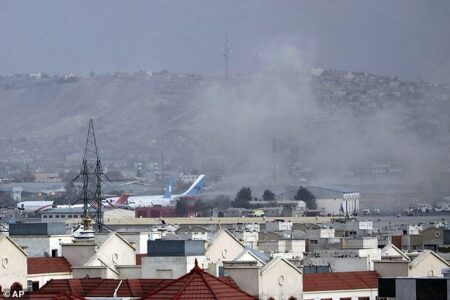
Islamic State terrorists claimed responsibility for rockets fired at Kabul airport
A group aligned with Islamic State (IS) has claimed responsibility for several rockets fired at Kabul’s airport in the waning hours of a U.S.-led military operation to complete the withdrawal from Afghanistan of diplomats, foreign citizens, and Afghans who helped them over 20 years of war.
There were no immediate reports of casualties from the August 30 attack, which comes the day before the United States is set to withdraw all its remaining forces from Afghanistan, drawing to a close its longest-lasting war.
Islamic State’s Nasher News said on its Telegram channel that its militants, operating under Islamic State-Khorosan (IS-K), fired six Katyusha rockets at the airport.
Pentagon officials said at a briefing that five missiles were fired and that one was intercepted by anti-missile defenses. Another rocket landed inside the airport perimeter “with no effect,’ Major General Hank Taylor said, adding that the other three landed outside the airport perimeter.
The missiles show that the United States is dealing with “very real ongoing threats” as the August 31 deadline for completing the withdrawal approaches, Pentagon spokesman John Kirby said.
“We are in a particularly dangerous phase now,” Kirby told reporters, adding that enemy combatants still had the capability to carry out attacks.
Kirby defended a drone strike on August 29 that hit a vehicle near the airport, saying it was carried out to remove “what we believed to be a very real a very specific and a very imminent threat” to the airlift.
The military is certain that there was a secondary explosion after the vehicle was hit, Kirby said.
The subsequent explosions indicate there was a large amount of explosive material inside the vehicle that may have caused additional casualties, U.S. Central Command said earlier in a statement.
Kirby did not dispute reports that the strike killed a number of civilians but said the military always tries to avoid civilian casualties. An investigation was under way and the Pentagon would be “transparent” with the results, he said.
A Taliban spokesman said the strike resulted in civilian casualties and chided the United States for failing to inform the militants before ordering the strike. The Tolo news agency said at least 10 civilians died in the air strike.
The drone strike was the second carried out by the U.S. military over the weekend.
The first killed two members of Islamic State-Khorosan (IS-K) on August 28 in eastern Afghanistan in retaliation for a deadly suicide bombing outside Kabul airport two days earlier. The group claimed responsibility for killing the bombing, which killed more than 170 people — including 13 U.S. troops.
In recent years, IS-K has been behind some of the deadliest attacks in Afghanistan and Pakistan. While both IS and the Taliban are hard-line Sunni Islamist groups, they are bitter foes.
The Taliban has promised an inclusive government since sweeping back into power on August 15, and to exercise a softer brand of rule compared with their first regime in Afghanistan between 1996 and 2001.
But many Afghans fear a repeat of the militants’ brutal interpretation of Islamic law, as well as violent retribution for working with foreign militaries and missions and with the previous Western-backed government.
Source: RFERL





